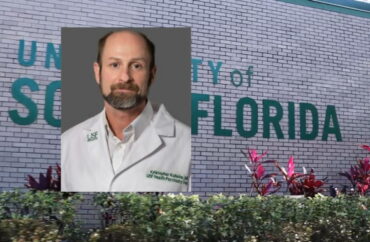
‘Affirmation approach’ for child gender dysphoria neither science-based nor good clinical care, psychiatrist says
Dr. Kristopher Kaliebe began medical school in 1995, finished his last fellowship in 2005, and is active in practicing and teaching medicine in the decades since, currently as a University of South Florida associate professor of psychiatry.
Prior to 2016, “I saw zero patients expressing gender dysphoria,” he told The College Fix in a recent interview.
Now, however, at the child psychiatry clinic he oversees at USF, there are times when the three or four residents he’s supervising might have three patients diagnosed with gender dysphoria between them, he said.
Kaliebe is sounding the alarm on the trend, and has become a prominent critic of gender affirming care and the suppression of open debate on this and other components of gender ideology.
“I’m displeased in this particular topic we haven’t been able to talk openly and freely,” he said.
Kaliebe isn’t staying silent. He has written about his concerns on Substack and spoke about them at the Heterodox Academy June conference.
“No one has a monopoly on the truth. … We all know more and learn better when we can have open, honest, free exchange,” he said in a July telephone interview with The College Fix.
“I think what has been most disturbing [is] that this is a topic that [has] become highly moralized and stigmatized. We did not have the type of rigorous back and forth that we’re supposed to have in medicine.”
The prioritization of advocacy and orthodoxy over the search for truth on matters related to gender dysphoria, as well as more broadly, Kaliebe said, can hinder the advancement of knowledge and potentially harm patients.
A pair of reports penned by Kaliebe can be found among a collection of newly released documents from a court case challenging a 2022 Alabama law that placed considerable restrictions on the surgical and pharmacological treatment of gender dysphoric minors in that particular state.
In one of the reports, citing internal documents and communications from the U.S. Department of Health and Human Services and the World Professional Association for Transgender Health, an organization that develops guidelines for the treatment of gender dysphoric individuals, Kaliebe details how the HHS and WPATH work to silence critics of gender affirming care while appearing “to know that evidence supporting the safety and efficacy of transitioning treatments for gender dysphoric youth is lacking.”
When asked why gender dysphoria seems to be skyrocketing among children, Kaliebe said there is no single answer.
“I think we’ve always had some kids who are from the beginning boyish girls and girlish boys and, up until quite recently, no one has ever called them transgender,” Kaliebe said. “I think a lot of people have sort of adopted that label [even though] it’s really clinically an inaccurate, misleading label to call a girlish boy or boyish girl transgender, because most of those kids…will grow up to be same-sex attracted adults.”
Additionally, he said, “small kids are very suggestible. So if they’re told that they’re quote-un-quote transgender, you know, they’ll believe it.”
Yet, Kaliebe said, “the biggest pool of…kids who are expressing gender dysphoria are not early onset kids. They’re kids that already have some neurocognitive or emotional disorder and…are declaring themselves to have a transgender identity.”
This sub-population, “never existed before” and seemed to emerge “at the same time that we moved from kind of a play-based childhood to a phone-based childhood” which, he said, has been associated with greater depression, anxiety, and body image issues, especially in girls, he said.
Given his long-standing professional interest in childhood sex and gender issues, and what he felt were his obligations as someone who teaches child psychiatry, Kaliebe said, he was curious about this phenomenon when it first emerged, as well as the promotion and acceptance of the “affirmation approach.”
The “affirmation approach,” he said, initially struck him as odd given that it is “so different than anything else we do in child psychiatry,” as did the use of medical interventions as a first choice for the treatment of this new phenomenon.
Kaliebe said he was skeptical of this approach early on and continues to stand by his skepticism.
When a psychiatrist sees a child experiencing gender dysphoria, he said, “I think the first thing that [they] would want to do is do a well-rounded psychiatric evaluation and look for what other comorbidities, meaning other mental health problems, are there,” as well as potentially explore whether the development of the condition coincided with some other event in the child’s life.
The psychiatrist would then treat the “more traditional mental health concerns like depression or anxiety” with cognitive therapy, medication, or other traditional approaches, he said.
More medicalized approaches, he said, seem to lack an evidence base.
However, Kaliebe noted, many professional medical organizations have gone in a different direction, deferring to ideology over science.
As for why this is happening and why so many practitioners seem to be going along with it, Kaliebe said, professional organizations such as the American Academy of Child and Adolescent Psychiatry and the American Academy of Pediatrics can be driven more by leadership and the members of expert committees than by membership.
These organizations, he said, each have a gender committee, often comprised of self-appointed experts. These self-selected individuals, Kaliebe added, tend to be the people who write the guidelines on which many practicing physicians rely.
Yet, “unfortunately in this case … the gender experts got together and took us to a position which, you know, neither was science-based nor was good clinical care,” he said.
“[Now] it’s really hard for [medical organizations] to backpedal and admit they’ve made a mistake and there’s a lot of implications for them admitting they’ve made mistakes so they’re reluctant to do so,” he said.
Instead, Kaliebe said, these organizations are “doubling down” and have become quick “to demonize and malign those who have a different viewpoint” as “anti-trans” or “dismiss [them] as promoting conversion therapy.”
Those who “were more interested in safeguarding were stigmatized as bad people and told that they should be discounted,” he said.
MORE: Oregon HS track coach fired for proposing ‘open’ division for transgenders sues district
IMAGE: University of South Florida
Like The College Fix on Facebook / Follow us on Twitter






Please join the conversation about our stories on Facebook, Twitter, Instagram, Reddit, MeWe, Rumble, Gab, Minds and Gettr.